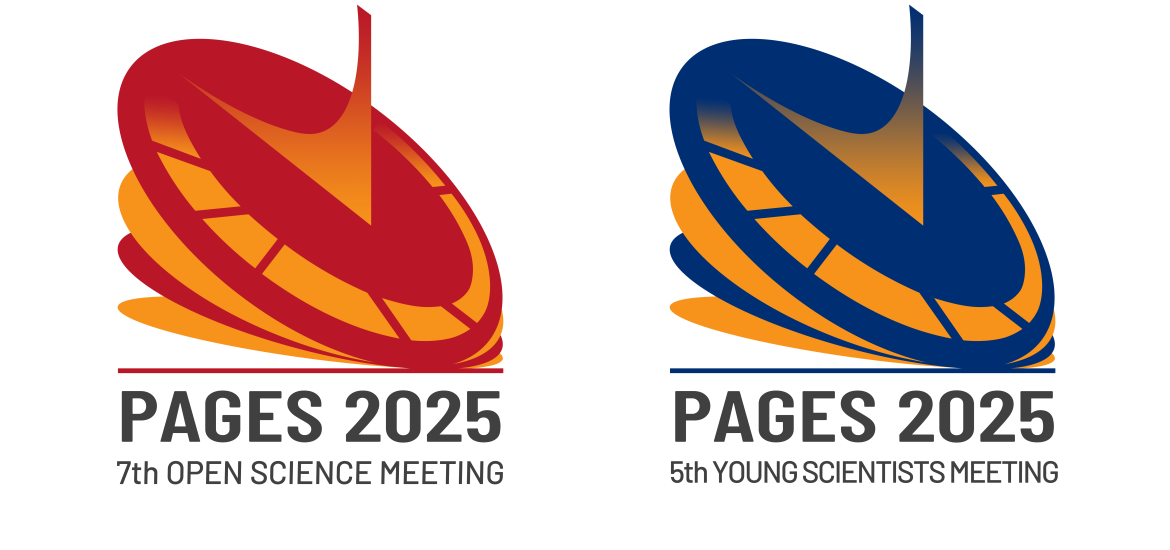- Home
- All News Overview
- About PAGES OSM and YSM

Tuesday, 6 February, 2024
Find out more about the PAGES Open Science Meeting (OSM) and Young Scientists Meeting (YSM).
Past Global Changes (PAGES)
PAGES (Past Global Changes) was founded in 1991 as a core project of the now defunct International Geosphere-Biosphere Programme (IGBP) until 2015. In 2016, PAGES became a Global Research Project of Future Earth, as well as a formal scientific partner of the World Climate Research Programme (WCRP), and is now supported by the Chinese Academy of Sciences (CAS) and the Swiss Academy of Sciences (SCNAT).
Since its inception, PAGES has served the paleoscience community by supporting research aimed at understanding the Earth’s past climate and environment, with the ultimate aim of assisting future predictions. PAGES’ science structure addresses changes in key components of the Earth system on various timescales: in particular, phenomena and processes that link the atmosphere, oceans, cryosphere, land surface, biosphere and society. It is open and inclusive to all scientists interested in past global changes.
Over time, PAGES has evolved to address emerging challenges and scientific themes, with resultant changes in structure and scope. But the main objectives remain unchanged, and, after 33 years, PAGES is well-established and continues to be successful in its mission to catalyze international cooperation and foster high-quality science.
Open Science Meeting (OSM)
The OSM is an international and multi-disciplinary platform/ meeting designed to encourage interaction between scientists of all career stages, disciplines and regions. The hope is that many contacts are made, and many collaborations and joint activities begun - that will endure long after the meetings themselves.
Held every four years, both the OSM and Young Scientists Meeting (YSM; see more information below) provide an invaluable opportunity to bring the past global change community together from around the world to share, discuss, learn, and plan for the future.
The location and organization of each OSM takes place through a competitive bidding process. The PAGES science community is invited, in an open call, to submit an "expression of interest" to host the upcoming OSM and YSM. In a second stage, a successful first-stage bidder is invited to submit a full bid.
Young Scientists Meeting (YSM)
The YSM, which takes place before the OSM, has a size of ~80 participants.
Before the first YSM was held in Corvallis, USA, in 2009, it was recognized that young scientists are critical to the future of paleoscientific endeavours.
The first YSM brought together 91 early-career researchers (ECRs) from 21 different nations.
The aim of the YSM is to support the development of young paleoscientists (ECRs) by providing the opportunity to advance their scientific skills and to build international networks among colleagues at a similar career level, as well as with leading senior scientists. ECRs are given the opportunity to present their work, while also participating in tutored workshops on topics that are pressing and important for ECRs today. Topics addressed have, in the past, included themes such as publication, outreach processes, communicating science, funding science, balance between research and private life, and more.
While the OSM follows a more “classic” large-meeting format where the registration procedure and the official program are symbiotic in that participants submit an abstract and the corresponding talk/poster forms part of the official program, the YSM follows a slightly different format.
For the YSM, a predetermined YSM Scientific Committee (SC), sets the agenda and program (the format) for the YSM meeting. The format is designed to provide ample room for discussion, Q&As, possible panel discussions, plenary talks, and breakout sessions, as well as poster/oral sessions, where ECRs present their research.
In order to attend the YSM, ECRs must apply. All applications are screened by the pre-selected YSM SC for elligibility, based on criteria such as ECR status, relevance of research to PAGES science, geographical location (to ensure diversity and inclusivity), etc. Approximately 80 candidates are selected, and are then invited to register for the YSM, and OSM thereafter. There is funding available for ECRs, which can be applied for simultaneously.
All YSM participants are invited to participate in the OSM that takes place immediately after the YSM, to present their results to a larger community, and to build networks with senior colleagues.
Timeline of OSM and YSM meetings
1998 (20-23 April): 1st OSM "Past Global Changes and their Significance for the Future" - London, UK
2005 (10-12 August): 2nd OSM "Paleoclimate, Environmental Sustainability and our our Future - Beijing, China
2009 (8-11 July): 3rd OSM "Retrospective Views on our Planet's Future" - Corvallis, USA
2009 (6-7 July): 1st YSM
2013 (13-16 February): 4th OSM "The Past: A Compass for Future Earth" - Goa, India
2013 (11-12 February): 2nd YSM
2017 (9-13 May): 5th OSM "Global Challenges for our Common Future: a Paleoscience Perspective" - Zaragoza, Spain
2017 (7-9 May): 3rd YSM
2017: The PAGES Early-Career Network (ECN) was formed. This group, which functions in much the same way as a working group (WG) “aims to facilitate the exchange of ideas and skill sets in order to give early-career researchers the tools to excel in their research fields. The ECN helps with the dissemination of information, establishes vital scientific networks, and fosters the development of ideas that can lead to future research collaborations and improved job prospects.”
2020: Due to the COVID19 pandemic, and the subsequent large uncertainties the Local Organizers of the OSM/YSM faced, the decision was made in 2021 to postpone the OSM/YSM, and then to host it fully online in 2022.
2022 (16-20 May): 6th OSM "Learning from the past for a sustainable future" - Online (Agadir, Morocco)
2022 (9-13 May): 4th YSM
2025 (21-24 May): 7th OSM "Earth System Changes from the Past towards the Future" - Shanghai, China
2025 (19-20 May): 5th YSM
> Go the 2025 OSM/ YSM website
The call for sessions for the 7th OSM is open. Deadline is 15 May 2024.
> More information
